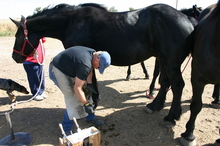In an article about horse hoof health in The American Farrier's Journal, Bruce McColl cites important information about poisonous plants and how they affect horses by restricting blood flow that ends up causing problems in horses' extremities such as their hoofs.

Farrier checking horses hooves
Poisonous plants affect horses in many ways since any ingested toxin that interferes with normal metabolic activity can keep important nutrients needed for hoof health from getting to where they are needed in the hooves.
Poisonous plants affect horses in many ways, as any ingested toxin that interferes with normal metabolic activity can cause problems. Here are a few examples of how plant, shrub and tree toxins can have an impact on horses:
- Red maple produces gallic acid that cause lethargy and anemia (breakdown of red blood cells) that reduce oxygen transport.
- Black walnut shavings should not be eaten, as the resulting toxins are absorbed through the hoof, causing founder or laminitis.
- Yews produce taxins that interfere with heart action.
- Black cherry produces cyanide, which can lead to a horseâs death.
- Azaleas and rhododendron can cause diarrhea and heart problems.
- St. Johnâs wort can destroy skin cells.
- Mycotoxins and fungi found on plants can cause difficulty with horses giving birth. For example, fescue poisoning is common in pregnant mares.
- The taxins found in alsike clover can cause liver problems.
- Milkweed can cause seizures, colic and sometimes death in horses.
- Sorghum grass (the milo family) produces cyanide, which sometimes leads to death.
- White snake root causes weakness and tremors.
- Water hemlock can produce considerable pain with horses and also be deadly.
- Mountain laurel is also deadly.
He advises farriers to make sure horse owners understand the seriousness of any digestive compromise in their horses caused by eating toxic plants. These digestive problems that cause a restriction in blood flow leads to hoof problems because important nutrients needed for hoof health cannot get to the hooves.
Article by Buck McColl - See more at: https://www.americanfarriers.com/articles/8375-can-eating-poisonous-plants-by-horses-lead-to-serious-hoof-concerns-afjho#sthash.3ajLJbol.dpuf
